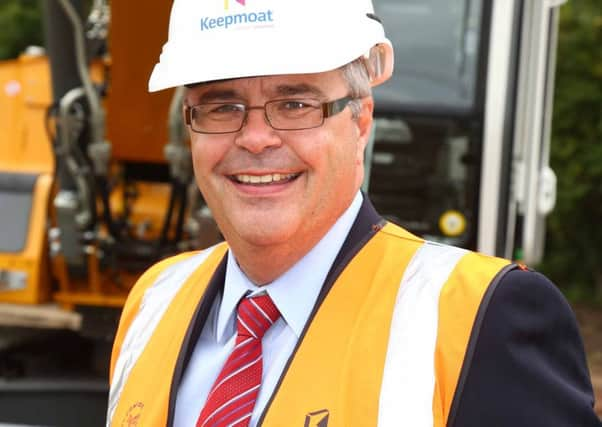PFI deals and expansion fuel growth at Keepmoat


Turnover at the Doncaster-based developer grew 17.7 per cent to £1.09bn in the 12 months to March 2015.
Profit before tax rose eight per cent to £54m, compared to £50m in the previous financial year.
Advertisement
Hide AdAdvertisement
Hide AdThe delivery of private finance initiative (PFI) contracts in Leeds and Pendleton, Manchester bolstered Keepmoat’s performance, along with expansion of its affordable homes division in the South of England.
It marks the group’s strongest revenue and pre-tax profit performance since Keepmoat merged with Essex-based rival Apollo in 2012.
Dave Sheridan, chief executive at Keepmoat, said the group’s business model meant it has “coped well” both with austerity and the growing housing market, and is well positioned to benefit from the Conservative government’s commitment to housing.
He told The Yorkshire Post: “It’s been a good year and we’re looking forward to another good year this year.”
Advertisement
Hide AdAdvertisement
Hide AdKeepmoat’s Regeneration division, which specialises in maintenance and construction projects for the social housing and the education sector, saw revenue climb 15 per cent to £832.4m.
Last year saw the first full-year delivery of major regeneration schemes in Leeds and Pendleton, boosting turnover for the division.
The firm also won a £100m contract to upgrade properties in Enfield, London and continued to build on relationships with local authorities, Mr Sheridan said.
Keepmoat Homes, which builds affordable housing aimed at first-time buyers, brought in £262.4m from the sale of 2,133 homes, up from £209.8m in 2014 and accounting for 24 per cent of the group’s turnover.
Advertisement
Hide AdAdvertisement
Hide AdThe group has continued to expand nationally, establishing itself in the South of England, developing sites in Cambridge and Peterborough.
It also opened a its 13th regional office in Scotland. The firm sees Scotland as “a real growth area” for both homes and regeneration in the coming years, Mr Sheridan said.
While redundancies were made following the 2012 merger and restructure, staffing levels in Keepmoat Homes have doubled, from 250 prior to merger to 500 now, Mr Sheridan said.
Growth in regeneration has been slower, but is back to around the same level as three years ago, at 3,300 permanent workers.
Advertisement
Hide AdAdvertisement
Hide AdThe firm expects its home division to see the greatest growth in the year to come, Mr Sheridan said.
The Government has announced plans for 200,000 new starter homes, alongside proposals for a Help to Buy ISA and a manifesto promise to build 275,000 additional affordable homes by 2020.
Strategic land and the redevelopment of brownfield sites are central to the Government’s plans, putting Keepmoat in a good position to capitalise on the plans, Mr Sheridan said.
He said: “Our specialism is building on brownfield land in partnership with local authorities.
Advertisement
Hide AdAdvertisement
Hide Ad“The type of homes the Government wants, which is the starter homes - the 2-bed, 3-bed properties - is what we specialise in. Our product, the land we build on and relationships we’ve got mean we’re in a great position when the Government turns the tap on with some of these initiatives.”
While there is continued speculation that interest rates could rise by the middle of next year, Mr Sheridan said the firm does not anticipate a major impact because of the changes.
Keepmoat’s average sales price - £123,000 excluding Cambridge, or £130,000 when the South-East city is included - is “well within people’s affordability stretch”, he added.
--
Keepmoat’s £400m private equity deal with Sun Capital and TDR Capital has seen a “positive start” for the developer, chief executive Dave Sheridan said.
Advertisement
Hide AdAdvertisement
Hide AdFormer Pizza Express owners TDR and US-based Sun Capital agreed to buy Keepmoat from Lloyds Banking Group in September 2014.
Mr Sheridan said: “We’ve bedded in with the new ownership, that’s been a real positive start for us. They really supported the business growth.”
Keepmoat was the subject of the biggest buyout on record in Yorkshire in 2007 - worth £783m - with backing from the Bank of Scotland’s integrated finance (BOSIF) division.
It was later majority owned by Cavendish Square Partners, before being held by Lloyds Banking Group and management after a 2012 refinancing deal.